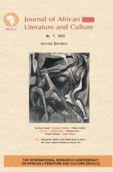Our featured scholars,
researchers and theoretical exponents in their studies of new and
existing literatures have exhibited knowledgeableness about how the
African experience of modernity associated with a Western paradigm is
fraught with corruption and tensions at various political, social,
economic and psychological levels of African communal and individual
existence, and its possible remediation through an imaginative
articulation of the greater unity and higher prospects in the
diversities, hybridity and fusions that are embedded in the external and
subjective realities of the black world. This is African literature at
its best artistic engagement.
Buy a Copy
Journal of African Literature and Culture 7 Charles SMITH (Ed) IRCALC, 2010
206 p.
ISBN: 9-789-7835-0341-0 Cover Design: Zito Brown
|
Author |
Title |
Pages |
PDF |
|
Editor
|
Art Across Borders |
7-8 |
Full Text |
|
1. FORUM ESSAY
|
|
JAMES A. PORTER |
The Trans-Cultural Affinities of African Art
Africa speaks
again through the complex variety of Negro art testifying to two significant
phenomena: first, that art is indeed a language; and second, that while
black Africa may be understood by only a small part of the world through the
medium of her native tongues, she has yet moved the world through the
language of art.
|
13-30 |
Full Text |
|
2.
ACROSS BORDERS
|
|
ANJALI GERA
ROY |
�Global flows�: Ethnographic
studies of the Hindi Movie in Africa
The celebration of Bollywood as a culture of
globalization to illustrate the reverse flows from the non-west to the west
is juxtaposed against the long history of transnationalization through which
Hindi cinematic texts were incorporated into African cultural practices to
assume African ethnic or national identities.
|
33-48 |
Full Text |
|
ROSETTA
CODLING |
African spaces in European
places: Aminatta Forna�s Ancestor Stones and Donato Ndongo�s Shadows of Your
Black Memory
The very genre of
the African novel serves to disembowel colonist, literary tendencies and
philosophies and assume an independent position in the landscape of World
Literature. Ancestor Stones and Shadows of Your Black Memory are among the
upcoming works that adhere to the formula of the African, not Western,
novel. And the characters Forna and Ndongo attest to the survival of
ancestral, ontological identities that can only be attributed an �African
literary� antecedent that defies the usurpation of Modernity.
|
49-74 |
Full Text |
|
MARLENE DE
LA CRUZ-GUZM�N |
Bi-living, Time and Space:
LeAnne Howe's Shell Shaker and Chin Ce's The Visitor
Here in both novels the colonial grand narrative of
the African or Red Indian savage in need of European civilization, the
post-modernist counter-narrative of a liberated post-independence failure,
and the indigenous postcolonial-or rather beyond-colonial-narrative of
ancestral oversight can all be processed together so that the
interconnections and the understanding of indigeneity, denigrating western
mythology about it, and its potential application for positive change can be
seen clearly in this borderland.
|
75-88 |
Full Text |
|
SHIRLEY J.
CARRIE |
�Genealogies of the Spirit�:
Ancestral Reclamation in the dramas of August Wilson
Contemporary Black intellectuals and artists like
August Wilson often signify the historical dispersal of peoples of African
descent in a redemptive narrative that suggests that diasporic body can be
re-born through the restoration of the dead. More importantly, the
commemoration of the ancestor figure anchors the diasporic subject to their
own uncertain present by enabling them to redeem the past. This cultural
reclamation of an African origin and/or roots is often tied to the solemn
remembrance of the Ancestor. |
89-108 |
Full Text |
|
3.
IDENTITY ISSUES
|
|
SMITA JHA |
Crisis of Identity in Chinua Achebe's A Man of the
People
Achebe�s search
for innate human qualities takes an ironic manifestation in A Man
of The People wherein he portrays two well-rounded characters
immersed in their own rationale of success and achievement and proves
that western cultural invasion together with the infiltration of material
luxuries poses a serious threat to tribal African values and amidst such
confusion the society loses its way.
|
111-128 |
Full Text |
|
DIVINE NEBA CHE |
Ayi Kwei Armah: Provincialising Old Centres and
Remaking the African Myth
Ayi Kwei Armah,
using revisionist mythology in his novel Osiris Rising, proceeds by
resuscitating the African past as a means of restoring lost African values.
This process of resuscitation, recycling and integration will not totally
erase previously assimilated values, for Africa owes a debt to the modern
nation states and vice versa, but aims to bring into limelight what has been
rejected or ignored for centuries: the ancient Egyptian myth of Osiris and
Isis and the building of the image of a vibrant Africa via literature.
|
129-144 |
Full Text |
|
ALEXANDRA UZOAKU ESIMAJE |
Igbo Cultural Representations in Female Fictional
Contexts: Flora Nwapa and Buchi Emecheta
In many early West-African novels, female
characters play almost no significant part, due largely to cultural
influences. Nigerian female writers like Flora Nwapa and Buchi Emecheta, are
resolute in their rejection and reversal of the negative characterization of
women and on the reorienting of cultural issues. Both showcase the same
traditional Igbo culture which several male writers have previously dealt
with in their works but introduce a new dimension in their re-treatment of
Igbo marriage customs. |
145-164 |
Full Text |
|
4.
LITERARY CHAT
|
|
OBITABA
ERAGUONONA JAMES
|
Entretien avec Sembene Ousmane
[Discussion with Sembene Ousmane]
L�interview porte
sur le r�le des mendiants dans Xala. Toutes les incorrections qu�il peut y
avoir dans cette transcription doivent lui �tre reproch�es.
[This interview
with Sembene Ousmane was held in Dakar, Senegal before his death in June
2007 and relates to the role of the beggars in Sembene�s popular novel Xala.]
|
167-206 |
Full Text |
